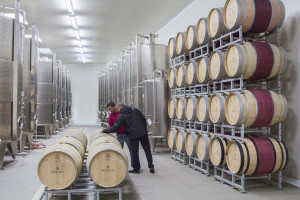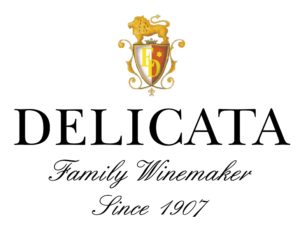Putting Sustainability at the Heart of Wine Excellence

Part of Delicata’s energy-efficient hall for barrel fermentation at cool temperatures.
Have you ever cared if there’s a drop of sustainability in your bottle of wine? Maybe you ought to because, quite frankly, wine consumerism oblivious to the well-being of environment and community is built not on rock but on sand.
Buying wine that has been made in a sustainable manner from vine to table, on the other hand, enables wineries and vineyards to continue to deliver an undiminished agricultural product for years to come and for future generations.
It’s the result of grape growing practices as well as winemaking methods that are sensitive to the environment, responsible to the needs and interests of society at large, and are economically viable to implement and maintain.
The search for affordable quality wine produced in sustainable and eco-friendly ways has never before been more rewarding, though, and is actually easy to find: right here at home.
In Malta, the Delicata winery for one is actively incorporating sustainability as a core value into its corporate strategy.
As creators of a domaine of over 190 ha of new plantings over the last two decades, Delicata has largely contributed to the Maltese ecosystem with green lungs of vines which are a pleasant sight to all, reducing soil erosion from otherwise untilled land. Home-grown grape supply is steady and local spending that otherwise would flow to overseas grape growers and auxiliary suppliers has a healthy multiplying effect on the Maltese economy.
It’s laudable to see that the winery’s proactive approach, which is completely voluntary and self-imposed, is now progressing to a more mature and holistic approach of sustainability. Going green is not only important in the vineyard but increasingly in the winery’s facilities, too.
In vineyards, Delicata viticulturists encourage the planting of cover crops to improve soil health and promote insectary growth. Vine prunings and pomace are returned to the ground as natural compost. Fungicides are employed to combat ailments only when absolutely necessary. Electronic devices monitor vineyard parcels and track weather from digital sources maximising the efficiency of drip-irrigation. Hand-picking of all grapes limits the times vehicles need to travel into the eco-system.
At the winery, the re-usable glass bottle system for Delicata’s wines has been kept in operation thanks to extra capital investment in machinery to remove today’s sleeved screw caps. Unlike imported wine bottles, Delicata’s are reused numerous times and have a long lifespan. The mantra is to reduce, reuse and recycle effectively, not just glass but also other materials. The make-up of packaging materials is being examined. Buildings are fitted with energy-efficient facilities such as the new thermal insulated fermentation vault for premium quality whites. Power saving technology helps regulate and conserve electricity and photovoltaic panels have been installed to help power up with clean and renewable solar energy.
Taken as a whole, these consciously taken, conscientious measures decrease the carbon footprint of the winery and, it stands to reason, of every consumer who cares to choose Delicata.
To summarise: there are three overarching principles that provide a general direction to pursue sustainability into the context of winegrowing. Sustainable viticulture and winemaking practices must be sensitive to the environment (environmentally sound), responsive to the needs and interests of society-at-large (socially equitable), and are economically feasible to implement and maintain (economically feasible).
For wine enthusiasts who don’t consider the topic of climate change a passing fashion, there’s comfort in knowing that team Delicata actually bridges the gap between the general principles and daily decision-making in the crafting of their award-winning Maltese wines.
This article by Georges Meekers appeared first in the Times of Malta, 19 February 2016.

